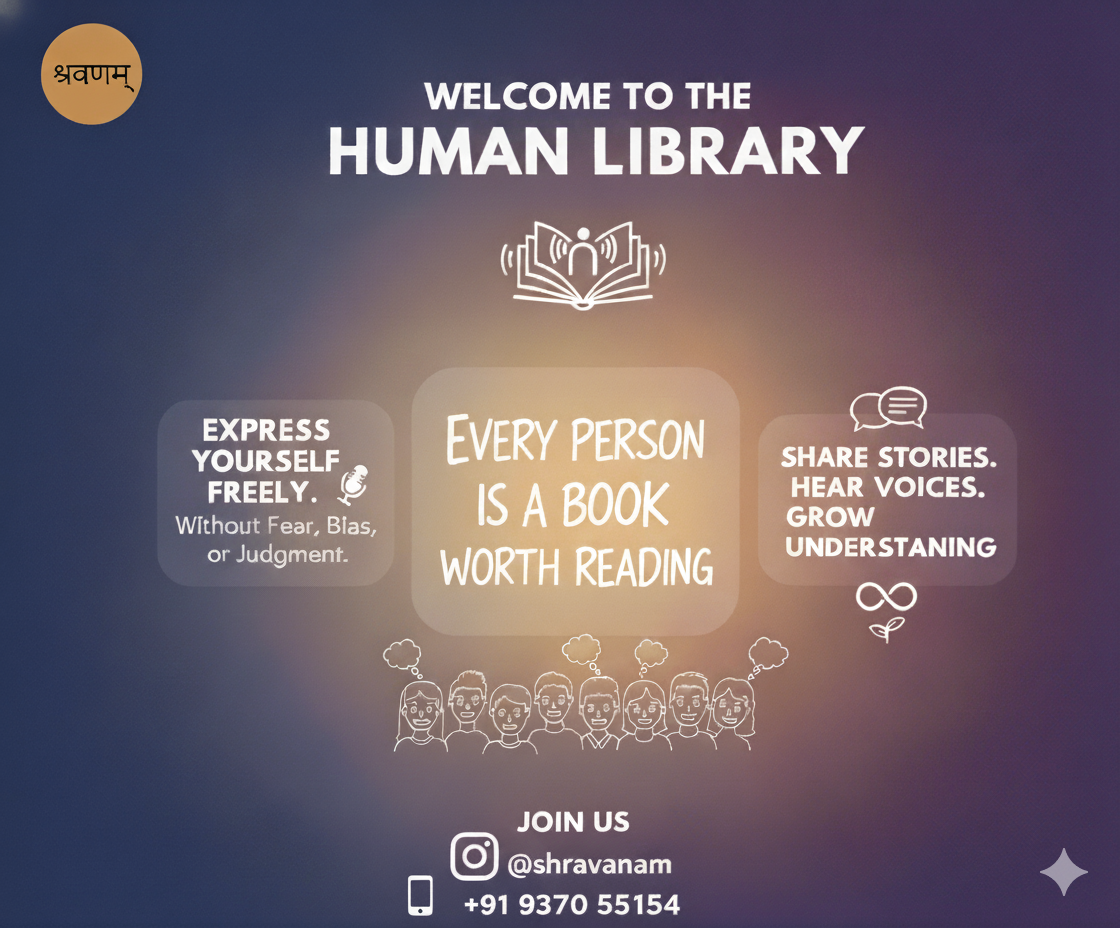
Human Library vs. Counselling: Understanding the Unique Benefits of Each for Personal Growth
In today's fast-paced world, finding avenues for personal growth, understanding, and connection is more crucial than ever. While professional counselling has long been a recognized and invaluable resource for mental health and personal development, a fascinating concept called the "Human Library" offers a different, yet equally powerful, approach to learning and empathy.
But what exactly is the difference, and when might one be more suitable than the other? Let's explore.
What is a Human Library?
Imagine a library where instead of borrowing books, you "borrow" people. A Human Library is an event designed to challenge stereotypes by creating a space for dialogue between individuals from diverse backgrounds (the "Human Books") and the public (the "Readers").
Key Characteristics of a Human Library:
Purpose: To build understanding, challenge prejudice, and foster empathy through direct conversation.
Format: Informal, one-on-one or small group conversations. Readers ask questions, and Human Books share their lived experiences and perspectives.
Focus: Sharing stories, perspectives, and experiences to bridge social divides and promote inclusion. It's about learning from someone's life, not fixing a problem.
Outcome: Increased empathy, broadened perspectives, reduced stereotyping, and a stronger sense of community.
Nature: Educational and experiential.
Okay, here's a LinkedIn blog post drafted to explain the difference between a Human Library and Counselling, perfect for sharing and sparking discussion!
Human Library vs. Counselling: Understanding the Unique Benefits of Each for Personal Growth
In today's fast-paced world, finding avenues for personal growth, understanding, and connection is more crucial than ever. While professional counselling has long been a recognized and invaluable resource for mental health and personal development, a fascinating concept called the "Human Library" offers a different, yet equally powerful, approach to learning and empathy.
But what exactly is the difference, and when might one be more suitable than the other? Let's explore.
What is a Human Library?
Imagine a library where instead of borrowing books, you "borrow" people. A Human Library is an event designed to challenge stereotypes by creating a space for dialogue between individuals from diverse backgrounds (the "Human Books") and the public (the "Readers").
Key Characteristics of a Human Library:
Purpose: To build understanding, challenge prejudice, and foster empathy through direct conversation.
Format: Informal, one-on-one or small group conversations. Readers ask questions, and Human Books share their lived experiences and perspectives.
Focus: Sharing stories, perspectives, and experiences to bridge social divides and promote inclusion. It's about learning from someone's life, not fixing a problem.
Outcome: Increased empathy, broadened perspectives, reduced stereotyping, and a stronger sense of community.
Nature: Educational and experiential.
Counselling is a professional relationship that empowers diverse individuals, families, and groups to accomplish mental health, wellness, education, and career goals. It's a structured and confidential process guided by a trained professional.
Key Characteristics of Counselling:
Purpose: To help individuals address specific personal challenges, mental health concerns, and emotional distress.
Format: Typically one-on-one, confidential sessions with a qualified counsellor or therapist.
Focus: Problem-solving, skill-building, emotional processing, and personal growth guided by therapeutic techniques. It's about working through personal issues.
Outcome: Improved mental well-being, coping mechanisms, self-awareness, and resolution of specific issues.
Nature: Therapeutic and clinical.
The Core Differences:
While both foster connection and growth, their primary aims and methodologies diverge significantly:
Objective: A Human Library seeks to broaden societal understanding and challenge prejudice through shared stories. Counselling aims to provide personal guidance and support for individual challenges.
Direction: In a Human Library, the focus is on a two-way exchange of lived experience. In counselling, the focus is on the client's specific needs, guided by the counsellor's expertise.
Relationship: Human Library interactions are peer-to-peer, focusing on shared humanity. Counselling involves a professional-client relationship with defined boundaries and ethical guidelines.
Privacy: Human Library stories are often shared openly (within the context of the event). Counselling sessions are strictly confidential and private.
Expertise: A Human Book's "expertise" is their lived experience. A counsellor's expertise is their professional training in psychology and therapeutic techniques.
When to Choose Which?
Choose a Human Library if you are looking to:
Learn about different cultures, lifestyles, or experiences.
Challenge your own assumptions or biases.
Develop empathy and understanding for others.
Connect with people you might not otherwise meet in an open, dialogue-driven setting.
Simply enjoy hearing compelling personal stories.
Choose Counselling if you are looking to:
Address specific mental health concerns (e.g., anxiety, depression, grief).
Work through personal trauma or emotional distress.
Develop coping strategies for life challenges.
Receive professional, confidential support and guidance for personal development.
Improve relationships or communication skills in a therapeutic context.
Conclusion
Both Human Libraries and professional counselling are invaluable resources, each serving a distinct yet complementary role in fostering a more understanding and emotionally intelligent society. While counselling provides a safe, expert-guided space for individual healing and growth, a Human Library offers a powerful platform for collective learning, empathy, and challenging the narratives that divide us.
Understanding the unique strengths of each allows us to leverage them effectively for both personal well-being and a more connected community.
